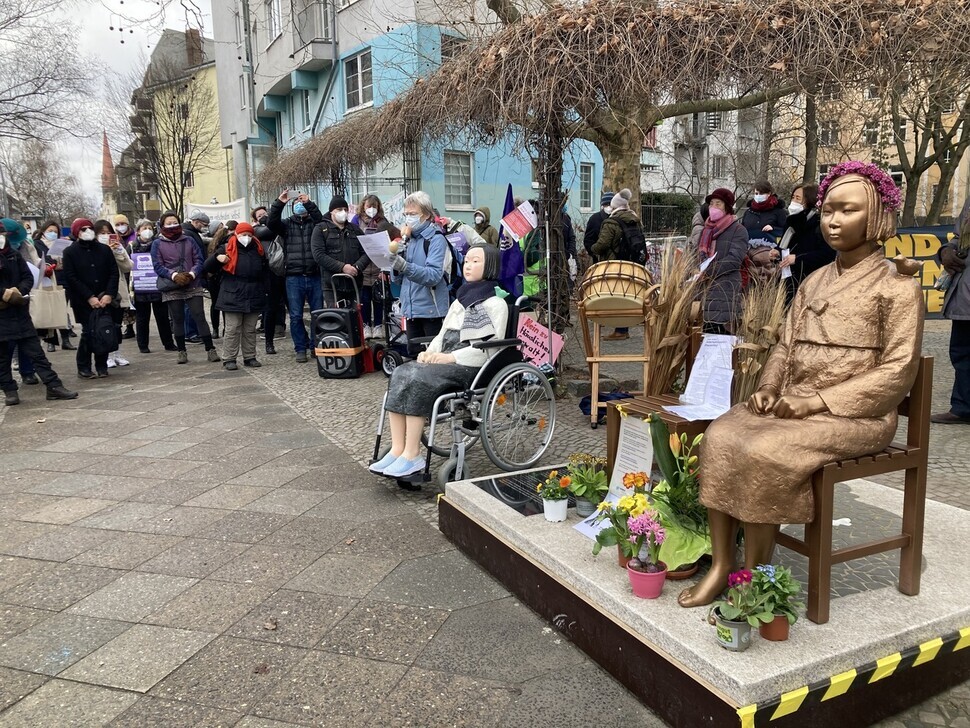hankyoreh
Links to other country sites 다른 나라 사이트 링크
Berliners celebrate International Women’s Day in front of comfort women statue

“Today is a day of historic significance. This is the first day we’re celebrating International Women’s Day in front of the Statue of Peace, along with the people of Berlin and particularly the people who are here in Moabit,” said Nataly Jung-Hwa Han, chairwoman of Korea Verband.
Han was speaking in front of the comfort woman statue in Moabit, a neighborhood in Berlin’s Mitte borough, on Saturday, two days before International Women’s Day.
Several hurdles had to be cleared before this celebration of International Women’s Day could take place here, in front of the statue.
When this comfort woman statue was erected in the fall of 2020, it was the first such statue to go up in a public space in Germany. But the Japanese government soon exerted pressure from various angles to have the statue removed. At one point, the borough of Mitte even issued orders for its removal.
But Korea Verband, a German-based civic group with Korean ties, joined with German citizens to launch a legal campaign, culminating in the decision at the end of last year to let the statue remain.
But efforts to remove the statue continue. Recently, three members of the Free Democratic Party (FDP) on the borough council moved to hold an open exhibition for artwork symbolizing wartime sexual violence and replace the comfort woman statue with a piece that would deal with wartime sexual violence more generally.
The rally was led by Korea Verband and Courage, a German feminist group, which had joined forces to set up the comfort woman statue. Around 200 local Koreans and members of civic groups in Berlin were in attendance, holding a banner that read, “We are the Statue of Peace.”
The comfort women system operated by the Japanese military was just one of a variety of women’s rights and human rights issues addressed during the rally. People at the rally also spoke about domestic violence, abortion, and human rights for ethnic minorities.
A group representing the Tamils, an ethnic group who live in southeast India and northeast Sri Lanka, said that “there will be no peace or freedom for the Tamils without a full investigation under international law.”
The UN estimates that between 80,000 and 100,000 people lost their lives in a civil war in Sri Lanka that raged from 1983 to 2009. The war was fought by Tamil rebels and government troops in a country that is majority Sinhalese. It’s alleged that war crimes, including massacres of Tamil civilians, occurred during the war.
“The Statue of Peace symbolizes women who were forced into sexual slavery. The statue is about the women who have publicly shared their experiences and challenged the patriarchy. The Statue of Peace must remain in Berlin,” Han said. “As a universal symbol of world peace, women’s rights and opposition to sexual violence, the Statue of Peace is also part of the history of Germany.”
“The Statue of Peace memorializes women who have been victims of every kind of wartime violence. The statue tells us that we can’t stay silent anymore,” said Choe Young-sook, president of Solidarity of Korean People in Europe.
“I heard that a lot of long-time community activists came out for the rally. It was surprising to see everyone out here and following the COVID-19 regulations even though the weather suddenly got colder,” said Jung Soon-young, one of the participants in the rally.
“I think it’s significant to hold this kind of demonstration in front of the comfort women statue for International Women’s Day, which is a time when we ought to be focusing on women’s rights,” said 16-year-old Mitusha Sentilkwara, a Tamil student who attended the rally.
By Han Ju-yeon, special contributor in Berlin
Please direct comments or questions to [english@hani.co.kr]

Editorial・opinion
![[Column] The state is back — but is it in business? [Column] The state is back — but is it in business?](https://flexible.img.hani.co.kr/flexible/normal/500/300/imgdb/original/2024/0506/8217149564092725.jpg) [Column] The state is back — but is it in business?
[Column] The state is back — but is it in business?![[Column] Life on our Trisolaris [Column] Life on our Trisolaris](https://flexible.img.hani.co.kr/flexible/normal/500/300/imgdb/original/2024/0505/4817148682278544.jpg) [Column] Life on our Trisolaris
[Column] Life on our Trisolaris- [Editorial] Penalties for airing allegations against Korea’s first lady endanger free press
- [Editorial] Yoon must halt procurement of SM-3 interceptor missiles
- [Guest essay] Maybe Korea’s rapid population decline is an opportunity, not a crisis
- [Column] Can Yoon steer diplomacy with Russia, China back on track?
- [Column] Season 2 of special prosecutor probe may be coming to Korea soon
- [Column] Park Geun-hye déjà vu in Yoon Suk-yeol
- [Editorial] New weight of N. Korea’s nuclear threats makes dialogue all the more urgent
- [Guest essay] The real reason Korea’s new right wants to dub Rhee a founding father
Most viewed articles
- 1[Column] Why Korea’s hard right is fated to lose
- 2Amid US-China clash, Korea must remember its failures in the 19th century, advises scholar
- 3[Column] The state is back — but is it in business?
- 460% of young Koreans see no need to have kids after marriage
- 5AI is catching up with humans at a ‘shocking’ rate
- 6Hybe-Ador dispute shines light on pervasive issues behind K-pop’s tidy facade
- 7Japan says it’s not pressuring Naver to sell Line, but Korean insiders say otherwise
- 8S. Korean chaebols comprise 84% of GDP but only 10% of jobs
- 9[Column] Can Yoon steer diplomacy with Russia, China back on track?
- 10Gangnam murderer says he killed “because women have always ignored me”